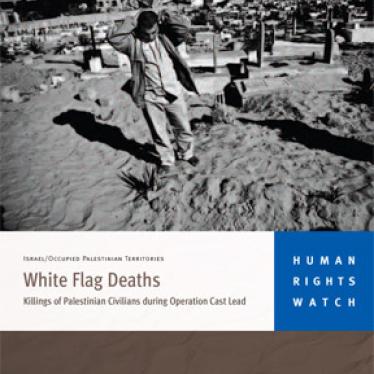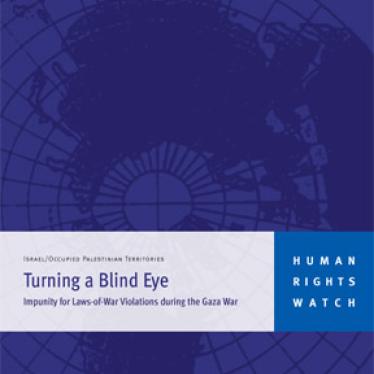(Jerusalem) – A military trial that ended August 12, 2012, failed to hold anyone accountable for the killings of a mother and daughter during Israel’s military operation in Gaza in December 2008 and January 2009, Human Rights Watch said today.
The two women were killed when an Israeli soldier opened fire on a group of civilians holding white flags to demonstrate their civilian status. The case concluded after a soldier pled guilty to “unlawful use of arms” without any conclusion that the action was linked to the killings. In a civil case, Israeli authorities paid compensation to the women’s families.
“The Israeli military received strong evidence in dozens of cases that its soldiers killed Palestinians unlawfully during Israel’s ‘Operation Cast Lead,’ yet the military has indicted only four soldiers, and jailed none on such charges,” said Eric Goldstein, deputy Middle East director at Human Rights Watch. “The scant accountability for the apparent crimes by Israeli soldiers casts grave doubt on Israel’s willingness to prosecute crimes by its forces.”
Rayya Abu Hajjaj, 56, and her daughter Majida Abu Hajjaj, 35 were killed at around 1 p.m. on January 4, 2009, while trying to leave Juhr al-Dik, a village near the Israeli border in central Gaza that had come under Israeli attack, witnesses told Human Rights Watch. After an Israeli military radio broadcast told civilians to leave, and to seek medical treatment for a child wounded by a shell that struck a house in which they had sought shelter that day, the women joined a group of around 28 Palestinians holding white flags, witnesses said. Two of the four witnesses said they saw an Israeli soldier open small arms fire on the group without warning, fatally wounding the two women. The other witnesses could not identify the source of the shooting.
The witnesses told Human Rights Watch that the Israeli military had refused permission to allow medical teams to reach the area after the shooting. Rayya’s son, Majid Abu Hajjaj, told Human Rights Watch that he returned to the family’s home on January 20 and found the bodies of his mother and sister in the street. “The bodies were still lying there – Majida had been run over by a tank,” he said. “The next day our neighbors came and brought us her [severed] foot. My mother’s body was in the yard, too, partially buried under some sand.”
Israeli and Palestinian rights groups, the United Nations Fact-Finding Mission on the Gaza Conflict, and journalists independently documented the shooting incident. The military has not sought to justify the fact that its troops opened fire, either by claiming that Israeli forces were under attack or that the women who were shot posed any threat.
The Israeli military prosecutor charged a soldier with the manslaughter of an unidentified Palestinian in the area where the women were killed, but the prosecution said it could not identify the victim. The prosecution closed its case against the soldier on August 12, dropping the manslaughter charge when he pled guilty to a diminished charge of “unlawful use of arms” for shooting his assault rifle without authorization.
The military court sentenced the soldier, identified as Staff Sgt. “S.” from the Givati Brigade of the Israel Defense Forces (IDF), to 45 days in jail. He will be the second Israeli soldier to serve jail time for his actions during the 2008-09 Gaza conflict, in which Israeli forces committed numerous apparent violations of the laws of war. Israel jailed one other soldier for seven-and-a-half months, for stealing a Palestinian’s credit card.
Israeli media reported that the prosecutor and the soldier’s lawyer agreedthere was no conclusive proof that the shooting had caused the women’s deaths because Palestinian witnesses and Israeli soldiers gave different versions of the incident to military investigators, including the date the women were shot. The prosecutor’s office apparently took no steps to re-interview Palestinian witnesses to help resolve the discrepancies, even though an Israeli rights group that helped facilitate the Palestinians’ testimony urged military investigators to do so in July 2010, when the military first published a brief description of the case.
The case points to serious flaws in the Israeli military justice system, Human Rights Watch said. The Israeli newspaper Haaretz reported in July 2010 that, “as in several other cases,” the January 2009 killing “was not reported up the chain of command beyond the battalion and brigade levels,” and that the military advocate general’s office, which is responsible for prosecuting soldiers for crimes, “only learned of the killing because Palestinians filed a complaint via human rights groups.” The Israeli rights group B’Tselem wrote to the military advocate general with extensive details about the case in May 2009. The military prosecutors filed charges against “S” in July 2010.
Human Rights Watch found that Israeli criminal investigations of apparent laws-of-war violations in the Gaza conflict were not prompt, thorough, or impartial. Investigations also failed to credibly examine policies authorized by senior levels of the country’s political and military leadership that may have led to violations of the laws of war, including rules of engagement that allegedly led to shootings of civilians, firing high-explosive artillery shells into populated areas, and the widespread destruction of civilian property.
In the Israeli military system, in many cases, alleged crimes are prosecuted only if soldiers from the unit that was involved first report the incident to officers in the chain of command. Since both the soldiers and the officers to whom they are reporting may be implicated in the violation, the system is not conducive to reporting events that should be criminally investigated, Human Rights Watch said. It also delays criminal investigations, which may not be initiated until after the reporting procedure, known as an “operational debriefing,” is completed. An additional problem is that the “debriefings” are intended primarily as a lessons-learned exercise and are not conducted by criminal investigators.
In July 2010, the military said it had opened an investigation after being informed of the killings. The military prosecutor indicted “S” for opening fire without authorization and for the manslaughter of an unidentified Palestinian in Juhr al-Dik on January 4, 2009, an Israeli governmental report stated, but the identity of the person “S” killed could not be confirmed. The report noted unspecified “inconsistencies” between the military’s initial investigations and other reports.
The military spokesman’s office said on July 6, 2010, that soldiers who were questioned said the shooting incident killed a Palestinian man and occurred on January 5, 2009, whereas Palestinian witnesses said it was January 4. This discrepancy contributed to the court’s conclusion that there was no proof that the women were killed when “S” opened fire.
B’Tselem, which helped arrange for the Palestinian witnesses to give testimony to the military, wrote to the military prosecutor when the military first reported the discrepancy, asking investigators to take steps to clarify the date. But the military prosecutor did not call the Palestinian witnesses for new interviews to clarify the discrepancies, B’Tselem stated.
Haaretz reported that “S”’s lawyers contended that no body had been recovered, although B’Tselem said it provided the military with the women’s death certificates.
On August 1, 2011, Israel agreed to pay 500,000 shekels (US$123,000) in compensation to the Abu Hajjaj family in a civil case filed over the women’s deaths. The family, represented by the Palestinian Center for Human Rights in Gaza, closed its civil claim as a result. Civil compensation for victims of international crimes does not relieve a state of its obligation to prosecute a deliberate killing of a civilian by its military forces, Human Rights Watch said.
With the conviction of “S,” the Israeli military courts have convicted a total of four soldiers for violations of Israeli military law during the 2008-09 Gaza conflict. A military court in November 2010 demoted and gave three-month suspended sentences to two soldiers for forcing a civilian boy to open a bag they suspected was booby-trapped (it was not).
In another case, an Israeli military court in February 2010 reprimanded a commander in the Givati Brigade for “exceeding his authority” by authorizing an artillery attack that hit the UN Relief and Works Agency field headquarters in Gaza City on January 15, 2009. No members of Palestinian armed groups were present in the UN compound. However, the court-martial case involved only the use of high-explosive artillery shells and did not try the commander for authorizing the use of white-phosphorus munitions in the incident, which caused extensive damage to the UN compound. Hundreds of civilians were sheltering there at the time.
In May, Israeli military courts exonerated the same commander of “criminal intent” or “negligence” for ordering an attack on January 5, 2009, on a civilian home where no members of armed groups were sheltering. The attack killed 21 members of the Samouni family. However, the military did not investigate reports that its forces repeatedly denied medical crews access to the Palestinian wounded in the area for three days after that attack. The International Committee of the Red Cross, which attempted to obtain permission from Israeli forces for medical access, later reported finding young children lying without food or water beside their parents’ dead bodies.
Investigations by Israeli, Palestinian, and international rights groups documented numerous cases of apparent serious violations by Israeli forces during the conflict, during which they killed hundreds of Palestinian civilians. Human Rights Watch documented other killings of civilians holding white flags, the wanton destruction of civilian property, indiscriminate shelling with white phosphorus in populated areas, and other abuses; as well as abuses by armed groups in Gaza against other Palestinians and indiscriminate rocket attacks that killed three Israeli civilians. Hamas authorities prosecuted no one for its own serious laws-of-war violations, but that does not relieve Israel of its independent duty to prosecute serious offenders.
“Israel should fix its broken military criminal justice system by ensuring that military personnel suspected of abuses are tried without unreasonable delay, and that prosecutors and courts diligently pursue all evidence,” Goldstein said. “If Israel’s allies are serious about forging a lasting peace in the region, they should press for reforms to ensure criminal accountability for unlawful killings, no matter who the perpetrators are.”








